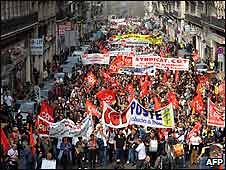
French workers have mounted a general strike against the right-wing, pro-corporate economic and social policies of the conservative government of Nicolas Sarkozy in Paris., a photo by Pan-African News Wire File Photos on Flickr.
SocGen Denies Rumors About Credit as Shares Tumble
By Jacqueline Simmons
Bloomberg News
Aug 10, 2011
Societe Generale (GLE) SA, France’s second-largest bank, denied “all market rumors” and asked the nation’s market watchdog for an investigation after speculation France’s creditworthiness was in doubt sent the shares tumbling.
The lender’s performance in July and early August shows it will be able to post “solid” results in the future, Paris- based Societe Generale said in a statement after the market closed yesterday. The bank asked France’s Autorite des Marches Financiers to open a probe into the origin of speculation that is “extremely harmful to the interests of its shareholders.”
Societe Generale led European bank stocks to the lowest since the aftermath of the credit crisis yesterday, tumbling 15 percent to 22.18 euros in Paris, the biggest drop since Oct. 27, 2008. France’s top credit rating was affirmed by all three major rating companies as speculation that Europe’s debt crisis would spread to the region’s second-biggest economy pushed the cost of insuring its government debt against default to a record.
“There is no indication whatsoever that France would waver in its determination to honor its obligations,” Dirk Hoffmann- Becking, an analyst at Sanford C. Bernstein Ltd. in London, said in a report to clients. “The resilience of the French banks against a freeze in the short-term funding market is very high,” he said, predicting that the sell-off in French banking shares “should be short-lived.”
European banks tumbled to the lowest since March 2009, when stocks fell to the weakest since the collapse of Lehman Brothers Holdings Inc. six months earlier. The Euro Stoxx Banks Index fell 8.9 percent to 109.87. BNP Paribas (BNP) SA, France’s largest bank, slid 9.5 percent to 35.61 euros and Credit Agricole SA (ACA) slumped 12 percent to 6.07 euros.
Watchdog ‘Vigilant’
France’s AMF said it’s watching to ensure “good functioning” of markets with an eye toward financial shares in particular.
“Like in each period of turbulence, the AMF is vigilant,” the regulator said in a statement read in a telephone interview.
Societe Generale said it has low exposure to peripheral European sovereign debt and has fulfilled “almost all” of its financing plan for 2011.
The company said Aug. 3 that it may miss its 2012 earnings target after second-quarter profit fell 31 percent because of a writedown on Greek government debt.
Societe Generale SA Chief Executive Officer Frederic Oudea defended the lender and said speculation that France’s creditworthiness is in doubt is “absolute rubbish.”
“I think the situation is really under control in France and in good hands,” Oudea said in an interview yesterday with CNBC. “In such a market, you know, which is nervous, it’s really easy to circulate absolutely unfounded information.”
ECB Intervention
The London interbank offered rate, or Libor, for borrowing in euros for three months was 1.5 percent yesterday, according to the British Bankers’ Association. Societe Generale reported a rate of 1.46 percent for the same period.
The European Central Bank was forced to buy Spanish and Italian bonds yesterday, according to four people with knowledge of the transactions. The amount of securities acquired by the central bank was smaller than in the previous two days, said one of the people, who asked not to be identified because the trades are confidential.
The extra yield investors demand to buy 10-year French debt rather than German bunds jumped to 90 basis points, even though both carry AAA grades from the major rating companies. That spread is almost triple the 2010 average of 33, and compares with 17 in the second half of the previous decade.
Francesco Meucci, a spokesman for Moody’s Investors Service, said in a telephone interview that the country’s Aaa grade is “stable,” echoing his counterparts at Standard & Poor’s and Fitch Ratings.
‘Fear Effect’
French bonds are the most costly AAA government securities to insure as investors raise bets that top-rated euro-region nations may be next in the firing line after the U.S. was downgraded one notch to AA+ by S&P on Aug. 5. Credit-default swaps on France trade at more than double the rate to protect German securities, CMA data show.
Swaps pay the buyer face value in exchange for the underlying securities or the cash equivalent should a borrower fail to adhere to its debt agreements.
BNP options prices rose to the highest level since at least 2005 and Societe Generale’s reached a two-year high.
The slide in French banking shares “seems to be prompted by concerns about the U.S. downgrade and the idea that France could be next, but that’s something Standard & Poor’s has denied,” said John Raymond, a banking analyst at CreditSights Inc. in London. “I don’t see any reason for what happened,” he said. “It seems to be a fear effect.”
To contact the reporter on this story: Jacqueline Simmons in Paris at jackiem@bloomberg.net
To contact the editor responsible for this story: Frank Connelly at fconnelly@bloomberg.net
No comments:
Post a Comment